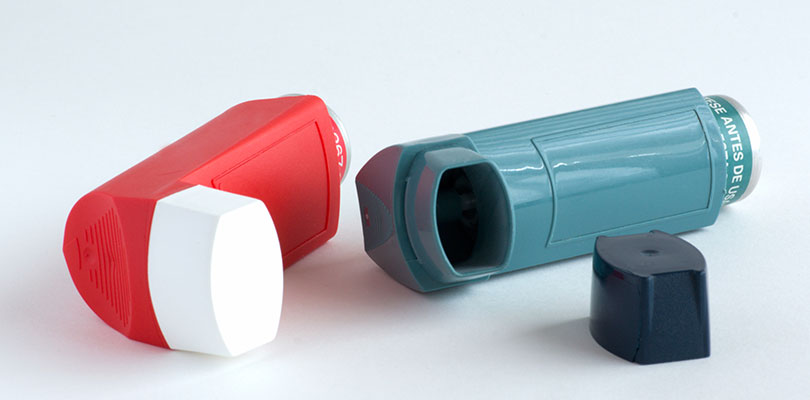
Photo Credit: luckyraccoon / istockphoto.com
Get Through the Winter More Comfortably With These Smart Adjustments
When you live with asthma, winter is a complicated season. The cold, wind and snow will slow anyone down; but when those triggers threaten your ability to breathe, discomfort can quickly turn into danger.
The two major culprits behind winter asthma woes are cold, dry air and a surge in respiratory infections, like the flu. Both of these will challenge your breathing, worsen your symptoms, and raise your chances of having an asthma attack. However, there is plenty you can do to reduce the risks and keep your asthma in check all season long.
1. Get a Flu Shot
Protect against winter’s biggest respiratory threat by getting your annual flu shot. The vaccine is recommended for most people over age 6, and strongly recommended for anyone at higher risk for respiratory problems. Asthma doesn’t make you more likely to contract the flu, but it can mean more severe symptoms and serious complications if you do get sick.
There are two versions of the flu vaccine: injected and inhaled. The inhaled nasal spray is made with a live virus, while the traditional shot injects a deactivated virus into the body. Those with asthma should always get the injected form.

Photo Credit: DragonImages / istockphoto.com
2. Use Healthy Heating
You rely on heating in cold weather, so make sure your system is ready to go. Clean your air ducts every year before you first start up your furnace for the winter.
Replacing filters is crucial if you want to avoid blowing dust and debris into your breathing space, and while you’re at it, be sure to thoroughly clean any humidifiers so they’re free of mold and mildew.
Sitting by a roaring fire may seem like a natural way to warm up, but burning wood sends all sorts of irritating smoke and toxic compounds into the air. Stay far away from open fires in fireplaces to avoid an asthma attack.
If you can’t seem to shake the cold, use a hot water bottle for gentle, soothing heat, or warm up from the inside out with soup and tea.

Photo Credit: YanLev / istockphoto.com
3. Accessorize Wisely
It’s natural to shy away from the cold, howling wind, but it’s unrealistic to shut yourself in for an entire season. You’ll have to venture out sooner or later, and that’s perfectly alright — as long as you bundle up right.
Dressing for asthma in the winter is about staying warm, but also about regulating your humidity. To stay comfortable and healthy at your core, you need to stay dry: wear thin but warm, sweat-wicking materials (like merino wool) close to your body on cold days to keep the chill away. Wrap a scarf over your mouth and nose so with each breath you take, you warm and humidify the air before it reaches your lungs.

Photo Credit: Elenathewise / istockphoto.com
4. Keep the House Clean
Indoor allergens can really add up when you’ve got air recirculating through the vents and most of your time is spent in the house. Help your asthma by keeping triggers far away. Dust and vacuum more often, wash bedding in hot water every week, and keep pet hair off furniture (and pets out of the bedroom).
You can give your indoor air a bit of a boost with a few green houseplants. Ivy, peace lily, pothos and bamboo palm are all beautiful, living accessories that will purify the air of formaldehyde, carbon monoxide, and other nasty pollutants before they begin to bother your airways.
The verdict is in: as long as it is done safely and with approval from your doctor, exercise greatly benefits asthma suffers.

Photo Credit: Pilin_Petunyia / istockphoto.com
5. Leave Time for Warm-Up
Don’t give up on exercise just because it’s cold out, but do make sure you pencil in a bit more time for your workout warm-up. Studies show that asthma symptoms are more muted and manageable during exercise when you’ve spent 15 to 20 minutes building your body heat and stretching your muscles.
When the thermometer drops really low, it’s best to exercise inside. You’ll know if it’s too cold for you when your symptoms quickly build up to uncomfortable levels.
If you can’t join a local gym, set up a small space in your home where you can skip, lift, jump and stretch. Invest in a new yoga, Pilates or aerobic video to keep you active and engaged when it’s just too frigid to be outside.

Photo Credit: 58shadows / istockphoto.com
6. Update Your Action Plan
Now’s the time to revisit your asthma action plan, assessing what measures you have in place and making some careful adjustments where needed. If it seems like your inhaler isn’t bringing as much relief as it once did, bring it up to your doctor; you may need a new dosage, or perhaps a new medication to control your symptoms more effectively.
Your action plan should be clear, succinct, and cover both short-term and long-term management approaches. Know when you should call the doctor and when to call an ambulance. Post your plan on your fridge or in another obvious place so you never have to look far for it.

Photo Credit: Luxian / istockphoto.com
7. Focus on Prevention
Taking your preventative medication before heading out into the elements will provide some welcome insurance against the heightened risk. Experts suggest using your bronchodilator at least 30 minutes before going out into the cold, to ready your airways for the dry air and drastic temperature change. Of course, your rescue inhaler is also indispensable so be sure you keep it with you at all times.
Stress is a big trigger for health issues, and the holiday season is a stressful time for many people. Take extra care to rest and give yourself the space you need to calm, energize or regroup. Staying one step ahead of any threats to your health — whether emotional or physical — can make a huge difference.

Photo Credit: shironosov / istockphoto.com
8. Talk to Your Friends and Family
Since asthma symptoms can get worse and attacks more frequent in the winter weather, discuss the warning signs with the people in your life so they’ll know what to do in case of trouble. If you’ve had an attack before, you probably know which are your most telltale symptoms: coughing more than usual, wheezing, tightness in your chest, or difficulty speaking in full sentences.
It might be a good idea to pass along your doctor’s number to your close friends and family in case there’s an emergency and you’re not able to handle it yourself. The better you communicate with them now, the better everyone will understand the dangers and the faster treatment can be administered.
Winter can be a bit isolating, especially when the weather takes a turn for the worse. Try to stay connected with neighbors, friends and family, planning gatherings or excursions here and there. The company will keep you happy and energized, and it’s always better to have people around to help if your asthma begins to get the better of you.
Both asthma and COPD hamper your respiratory system, making breathing uncomfortable, and at times, nearly impossible but the two conditions are different.







